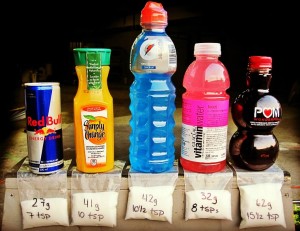Years ago, parents were warned not to let their children consume too much sugar as it would result in hyperactive behavior. Then, research came out that assured parents that there didn’t seem to be a strong connection between consumption of candy and wired children. Guess what, parents?! The experts have changed their minds again. According to a study at Yale University, consumption of energy drinks is reflected in both hyperactivity and inattentive behavior in middle school children – ages 11-13.

What makes these results different is that the substances being examined contain sugar, but also contain a substantial amount of caffeine. The combination is what changes the situation. The study reports that earlier research connects sugary drinks with hyperactivity and poorer academic outcomes – but please remember, these findings are correlational. That means that it may not be that the ingestion of sugar causes the hyperactivity. It is equally likely that hyperactive children are attracted to sugary drinks. A strong correlation does indicate that there is some common factor so parents need to be careful about letting their children drink anything that has a lot of sugar in it.
This study also found that boys (you knew we were going there) were more likely to drink energy drinks and that black and Hispanic children were more likely to consume the drinks than were their white classmates. Since boys and children of color are more likely to be identified with attentional disorders anyway, parents should abide by the American Academy of Pediatrics recommendation that children drink NO energy drinks.
What do they need these drinks for anyway? Pre-teens are not known for having a general lack of energy. I’ve been pointing out to my students for years that they don’t need sports drinks either. The original one, you know the one I’m referring to, was designed for football players in full uniform who were playing in a very hot and humid climate. I point out to my students that unless they sweat that much for over an hour, what they really need is water. The problem with drinking a sports drink that also has lots of sugar is that it can be slightly dehydrating. If the body doesn’t need all that sugar, it will use some of the liquid in the drink to help the body excrete the excess sugar. Yes, the body does need to replace electrolytes lost in sweat, but most children eat a diet with sufficient salt so that they don’t need any more. They might need a bit more potassium, but eating a banana, some yoghurt, a handful of dried apricots, or some spinach will provide all that is required with a great deal less sugar.
The results of this study are enlightening. When I visit boys’ schools anywhere in the world, I frequently see evidence that the students are consuming energy drinks and sports drinks. Aside from the cost of these drinks and the extra trash that is created when the containers are discarded, I have long felt that these substances were unnecessary. Now we find out that they are actually part of a situation which leads boys to have trouble in school.
So get a cool non-disposable container for water that has a clip to attach the bottle to the backpack. Tell your son he is part of an emerging trend and that all he needs is water. I don’t think I need to warn you to check the bottle every now and then to make sure that he is not smuggling contraband to school in the form of energy drinks. Yes, he will complain – “but Mom, I neeeeeeed the caffeine to wake up in the morning!” Tell him that if he gets to sleep a bit sooner, he will be just fine. If you son has been drinking several of these caffeine laden drinks a day, he will suffer from withdrawal in the form of a headache, so you might want to start this regimen over a holiday or long weekend. Oh, you didn’t know that caffeine is addictive? Absolutely. One more reason to make sure that your child does not indulge in these caffeinated, sugar-laden drinks.
